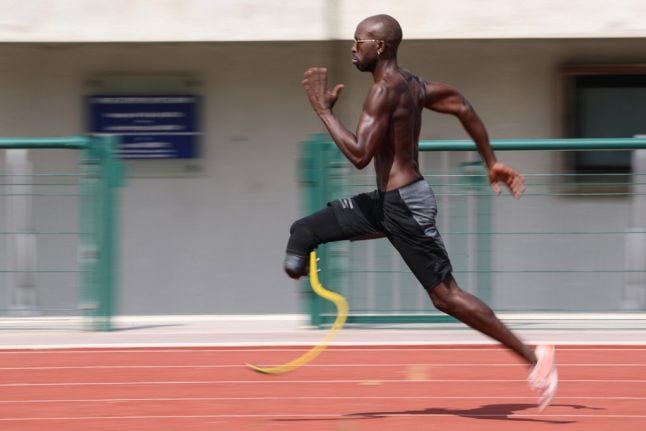He normally slopes in sullenly and doesn’t fully warm up until the coffee break. But last night he stuck his head around the door, all smiles, and, having established that he had everyone’s attention, bounced into the room waving about an inflatable finger-pointing hand, Swedish flag-coloured, playfully patting us all on the head with it as he found his seat.
Arri had been to Medborgarplatsen to welcome Sweden’s hockey heroes back from their gold medal conquest at the Winter Olympics in Turin. He was positively gushing with the buzz of the occasion.
“HUNdratusen människor!” he said, several times. A hundred thousand people!
“I’m not lying! A hundred thousand, at LEAST!”
Actually there were 25,000 people in the Södermalm square, but Arri’s excitement enthused the rest of us and soon the lesson was hijacked by talk of Sweden’s exploits at the Olympics.
It’s a funny thing, sport. It ferociously divides families who support opposing teams, and then it unites people from Cuba, Chile, Morocco, Somalia, England, Greece and Bosnia under an alien yellow and blue flag.
There we all were, proudly singing the praises of Anja Pärson and Anna Carin Olofsson and Björn Lind, the female curlers, whatever their names are (I know, I could look them up – or make them up), and, of course, the Tre Kronor, the new kings of ice hockey.
Just for once it was something positive that united us in our feelings towards Sweden rather than the notion of tackling a common enemy.
Actually there were two dissenters, Gregor from Russia and Garry from the US. They made the point that their countries had won considerably more medals than Sweden but Cuban Bobby, not keen to hear his new winter sports idols disparaged, made a few noises about relative populations and flexed his thigh-like biceps menacingly.
Could this be taken as a measure of our increasing integration? Are we beginning to feel a swelling in the breast as the opening bars of Du gamla, du fria strike up? Are we at last starting to fiddle with the apron strings of Mother Sweden?
The sight of a young Somalian refugee jabbing an inflatable yellow and blue hand at an American who dared to suggest that ‘Foppa’ is not the best hockey player in the world would certainly give the folk at the Swedish Board of Migration something to chew on.
But they would be wrong to equate sporting loyalty with a level of integration, just as Norman Tebbit, a British political heavyweight of the Thatcher era, was when he said in 1990 that many of Britain’s Asian immigrants would “fail to pass the cricket test”.
Tebbit didn’t like the fact that Asians in the UK continued to support India or Pakistan or Bangladesh in the cricket, and saw it as a refusal to integrate into British society.
There are several reasons why this was a silly thing to say, and perhaps reflected Tebbit’s lack of real sporting interest.
The first is that real sports fans do not change sides. You do not grow up in New York supporting the Yankees and then switch to cheering for the Minnesota Twins when you move to Minneapolis. Or at least you shouldn’t.
You certainly wouldn’t wear the red of Liverpool Football Club throughout your Merseyside childhood and then switch to the blue of Chelsea when you move down to London.
Nor should you be expected to switch national sporting allegiance when you move to a different country.
But what if people do? Does that make them any more integrated with the country? Not necessarily. Walk down the back streets of Bangkok or Beijing and you’ll see people wearing Manchester United football shirts all over the place. That doesn’t make Thai or Chinese teenagers any more fond of Manchester.
What it shows is simply that everyone loves to celebrate success. It’s infectious.
Until these Olympics I’d never watched a game of ice hockey in my life. But the passion of my Swedish friends for the game was hard to resist – as was the hysteria of the radio commentators during the final.
“We’re continuing on P4 with coverage of the game,” yelled one, as news time approached.
“If you want the news, you’ll have to change channel! But who the hell’s going to change channel? THIS is the news! Oh yes! OJ OJ OJ! Another Finnish player is off!”
“No he isn’t!” screamed his colleague.
“Yes he is! I saw the sign!”
“No you didn’t!”
As the clock counted down those dying seconds seemed like an eternity and I slipped further and further off the edge of my seat (said seat, slightly worryingly, being the car’s driving seat as we hurtled down a near-empty E4 back to Stockholm in a vain attempt to catch the end of the match).
Then finally, when Sweden clung on to beat Finland 3-2, the roar of delight, matching any Brazilian commentator’s “Goooooaaaaaallllll!” for sheer emotion, almost brought a tear to the eye.
“You were supporting Sweden!” said Mrs Syndrome, as the hot flush of victory wore off. She had me there.
“You were, you were actually supporting Sweden!”
For a moment I was peturbed. I had gone native. I would have passed the Tebbit test.
But I soon came back to my senses. Of course I was supporting Sweden. It was the Winter Olympics and I’m English. I had nobody else to support.
That’s the point, of course. I’m happy to enjoy a Swedish gold medal haul in sports where my home country barely participates. But when it comes to the World Cup in June I may be eating herring but I’ll be dreaming of roast beef and yorkshire pudding.
And I won’t be the only one harking back to the old country.
“I support the Tre Kronor! Always the Tre Kronor!” declared Arri, bursting with his new-found love of ice hockey. And he smiled broadly.
“Unless they play Somalia.”




 Please whitelist us to continue reading.
Please whitelist us to continue reading.